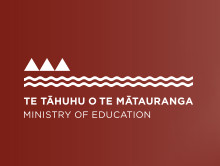Nā wai ngā kai o taku hāngi i kai?
nā Kēri Pewhairangi
This narrative is about Hēmi, who has just arrived home from mau rākau training. He’s hungry and is trying to find his hāngi.
Ngā hononga ki te marautanga
Te Reo Māori i roto i te Marautanga o Aotearoa (wh.59, 67, 76, 85, 94, me 102)
| Whenu | Whakarongo (Kōrero) |
| Kōeke | 2 |
| Whāinga paetae | Ka taea e te ākonga te āta whakarongo, te whakautu ngā kōrero e kōrero whānuitia ana ahakoa kei hea, kei hea. |
| Pūkenga | Ko te whakarite whakautu e hāngai ana ki te kaupapa o te pātai. |
| Whenu | Kōrero (Whakarongo) |
| Kōeke | 2 |
| Whāinga paetae | Ka taea e te ākonga te whakapuaki whakaaro ki ōna hoa, ki ngā pakeke e mōhiotia ana, ngā horopaki hoki e taunga ana te ākonga. |
| Pūkenga | Ko te whakawhitiwhiti mōhio pono e māmā ana te āhua. |
| Whenu | Tuhituhi (Pānui) |
| Kōeke | 2 |
| Whāinga paetae | Ka taea e te ākonga te tuhituhi mō tētahi wā ia rā hei whanake i te reo kua mau i a ia, hei kawe hoki i ōna wheako. |
| Pūkenga | Ko te tuhi whakamārama poto. |
| Whenu | Mātakitaki (Whakaatu) |
| Kōeke | 2 |
| Whāinga paetae | Ka mārama te ākonga ki te hononga o te reo ataata ki te reo ā‑waha, mehemea ka puta ake i ngā horopaki e taunga ana ia. |
| Pūkenga | Ko te tāutu i ngā mōhiotanga e tika ana kia mau i te ākonga mai i ngā reo ataata e whakaaturia ana ki te taha o te reo ā‑waha. |
| Whenu | Whakaatu (Mātakitaki) |
| Kōeke | 2 |
| Whāinga paetae | Ka taea e te ākonga te whakaputa reo ā‑waha, reo ataata hoki e pā ana ki ngā kaupapa e taunga ana ia. |
| Pūkenga | Ko te hanga i ngā ataata whakaniko te reo ā‑waha. |
Hei mahi
- Read the title to the students. Using Think, Pair, Share, students look at the picture and predict what may have happened to Hēmi’s hāngi. Set the task: “Read this story, and list the things Hēmi does to find his hāngi.” “Pānuitia tēnei kōrero ka tatau haere i ngā mahi i mahia e Hēmi hei kimi i tana hāngi.” The students’ read the story, list what Hēmi does and, finally, revisit their predictions.
- Explain the task to the class: “I tēnei rā e ako ana koutou i te takoto o te kōrero. Ka mahi takirua. Ko tā koutou mahi he āta pānui anō i te kōrero nei ka whakakī i te mahere.”“Today you are learning about the structure of a narrative. Work in pairs. Your task is to carefully read the story again and complete the narrative structure map.” An example is provided.
- The students’ task is to turn this story into a play and portray each character. The performance by each student needs to be consistent with the character, so students may need to re-read the story to develop their understanding of each character. The group performs the play for the class.
Aromatawai
The students list what Hēmi does to find his hāngi.
The students complete the narrative structure map.
The teacher assesses the students’ ability to portray the characters in the story.
| Ko wai? | He aha? | I hea? |
Te hiahia o Hēmi? |
I tutuki tana hiahia? | Te mutunga | |
|
I te tuatahi Hei tauira | Ko Hēmi. | E whakaaro ana mō tana hāngi. | I te wāhi whakangungu mau rākau. | Kia tere tana hoki ki te kai i tana hāngi. | Kāore. | Ko tērā whakaaro anō kia tere hoki ia. |
| I te tuarua | ||||||
| I te tuatoru | ||||||
| I te tuawhā | ||||||
| I te tuarima | ||||||
| I te tuaono | ||||||
| I te tuawhitu | ||||||
| I te tuawaru | ||||||
| I te mutunga |



